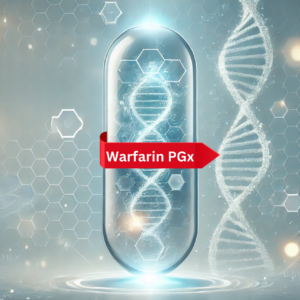Comprehensive Onco PGx Test
The Comprehensive Onco PGx test is an advanced pharmacogenomic tool designed to optimize cancer treatment by analyzing how an individual’s genetic profile influences their response to key oncology medications. By integrating DNA testing for cancer treatment with personalized strategies, this test allows clinicians to select the most effective cancer medications tailored to a patient’s genetic makeup, minimizing side effects and improving overall outcomes.
1. Who Should Take the Comprehensive Onco PGx Test?
The Comprehensive Onco PGx test is ideal for individuals who are:
- Undergoing cancer treatment and wish to understand how their genetic profile influences the effectiveness of specific drugs.
- Concerned about the potential side effects of chemotherapy or targeted cancer medications.
- Interested in optimizing their treatment plan by incorporating gene-guided recommendations.
- At risk for genetic variations that impact drug metabolism and efficacy.
- Seeking personalized strategies to reduce adverse effects and enhance the efficacy of cancer medications.
This test is essential for those looking to personalize their cancer treatment based on genetic information, ensuring that medications align with their unique genetic profile.
2. Why is This Test Important?
Cancer treatment is not one-size-fits-all. The effectiveness and safety of cancer drugs can vary significantly depending on genetic factors. The Comprehensive Onco PGx test provides valuable genetic insights that help tailor treatment strategies, optimizing outcomes and minimizing side effects.
Here are the key reasons why genetic testing for oncology is important:
- Improves Drug Effectiveness: By understanding the genetic factors that influence drug responses, clinicians can select the right cancer medications to maximize treatment effectiveness.(4)
- Reduces Side Effects: Certain genetic markers can predict adverse drug reactions. By knowing your genetic predispositions, oncologists can adjust treatments to reduce these risks.(4)
- Supports Precision Cancer Treatment: With gene-targeted medication, cancer treatments are customized to each patient’s genetic profile, improving outcomes and minimizing unnecessary treatments.(5)
- Enhances Survival Rates: Personalized treatments based on genetic testing increase the likelihood of better responses, ultimately improving survival outcomes.(4)
Genetic testing for cancer offers an unprecedented level of insight that enables patients to receive the most effective treatment tailored to their genetic makeup.
The Impact of Onco Drugs and Genetic Insights in Cancer Treatment:
- Genetic polymorphisms in 23 genes involved in gemcitabine metabolism, particularly in CMPK1, SLC29A1, and TLE4, have been found to significantly impact progression-free survival in breast cancer patients, with specific genotypes associated with improved or worse outcomes, emphasizing the potential of pharmacogenetic testing to optimize gemcitabine efficacy.(1)
- This study conducted in India identifies cisplatin and paclitaxel as the most common anti-neoplastic drugs causing adverse drug reactions (ADRs) in cancer patients, with anemia being the most frequent, followed by nausea and vomiting (20.6%). It also highlights that 15.8% of patients experienced leucopenia and 3.6% had neutropenia, emphasizing the need for early detection, dose modification, and pharmacovigilance to reduce the impact of ADRs on patient safety and healthcare costs.(2)
- Anti-cancer drugs commonly used in India, such as cisplatin, paclitaxel, doxorubicin, and gefitinib, frequently cause adverse reactions affecting the skin, hair, nails, and mucosa, underscoring the importance of early detection, accurate diagnosis, and prompt management to minimize morbidity and psychological impact.(3)
3. DrOmics Pharmacogenomics Test for Onco Drugs
DrOmics Labs’ pharmacogenomics test provides personalized insights into how your genetic variations affect cancer drug responses, optimizing treatment effectiveness and minimizing side effects. By analyzing a wide range of genetic markers, it delivers precise recommendations for chemotherapy, immunotherapy, and targeted medications. This advanced test enhances drug efficacy, reduces the risk of adverse reactions, and equips oncologists with actionable insights to make informed, patient-centered treatment decisions.
| Drug | Disease |
| prednisone | Acute leukemia |
| thioguanine | |
| vincristine | |
| pegaspargase | |
| asparaginase | |
| mercaptopurine | |
| mitoxantrone | |
| tipifarnib | acute myeloid leukemia |
| gemtuzumab ozogamicin | |
| idarubicin | |
| cytarabine | acute non-lymphocytic leukemia |
| dacarbazine | Advanced medullary thyroid cancer |
| cyanocobalamin | Anemia |
| folic acid | |
| alemtuzumab | B-cell chronic lymphocytic leukemia |
| fluorouracil | basal cell carcinomas |
| dasatinib | blood cancers |
| lenalidomide | |
| bortezomib | |
| chlorambucil | |
| gimeracil | boost the effectiveness of anticancer drugs |
| temozolomide | brain cancer |
| thiotepa | breast cancers |
| docetaxel | |
| epirubicin | |
| letrozole | |
| exemestane | |
| estradiol | |
| testosterone | |
| endoxifen | |
| N-desmethyltamoxifen | |
| dexrazoxane | |
| vinblastine | |
| raloxifene | |
| anastrozole | |
| tamoxifen | |
| Platinum compounds | Multiple Cancers |
| methotrexate | |
| bevacizumab | |
| antineoplastic agents | |
| hmg coa reductase inhibitors | |
| topoisomerase I inhibitors | |
| geldanamycin | |
| Alkylating Agents | |
| Bisphosphonates | |
| egfr inhibitors | |
| corticosteroids | |
| radiotherapy | |
| platinum | |
| interferons | |
| nelfinavir | |
| difluorodeoxyuridine | |
| leucovorin | |
| fludarabine | |
| fentanyl | |
| doxorubicinol | |
| prednisolone | |
| vindesine | |
| SN-38 | |
| everolimus | |
| sunitinib | cancers of the kidneys |
| rituximab | chronic lymphocytic leukemia |
| nilotinib | |
| raltitrexed | colon and rectal cancer |
| irinotecan | colorectal and pancreatic cancer. |
| FOLFOX | |
| trifluridine | digestive system cancers |
| mitotane | drenocortical tumors and Cushing’s syndrome. |
| tipiracil hydrochloride | gastric or colorectal malignancies |
| capecitabine | gastrointestinal including pancreatic cancer |
| cetuximab | head and neck and colorectal cancer. |
| trastuzumab | HER2-positive breast cancer |
| pamidronate | hypercalcemia of malignancy |
| dexamethasone | inflammatory conditions in various body locations |
| temsirolimus | kidney cancer |
| axitinib | |
| daunorubicin | leukemia |
| busulfan | |
| allopurinol | |
| imatinib | |
| sorafenib | liver, kidney, and thyroid cancers. |
| pemetrexed | lung cancer |
| vinorelbine | |
| cyclophosphamide | lymphomas, and breast carcinoma. |
| erythromycin | macrolide antibiotic used to treat and prevent a variety of bacterial infections. |
| zoledronate | malignancy associated hypercalcemia |
| panitumumab | metastatic colorectal carcinoma |
| morphine | moderate to severe acute and chronic pain. |
| thalidomide | multiple myeloma |
| cladribine | Multiple Sclerosis (MS) and hairy cell leukemia. |
| granisetron | nausea and vomiting |
| dolasetron | |
| tropisetron | |
| palonosetron | |
| ondansetron | |
| anthracyclines and related substances | Neoplasms |
| midazolam | |
| ABT-751 | Non-Small Cell Lung Cancer |
| gefitinib | |
| icotinib | |
| paclitaxel | ovarian cancer |
| gemcitabine | |
| topotecan | |
| taxanes | |
| carboplatin | |
| aspirin | Pain |
| celecoxib | |
| ketamine | |
| FOLFIRINOX | pancreatic cancer |
| lonafarnib | Processing-deficient progeroid laminopathies |
| abiraterone | prostate cancer |
| atrasentan | |
| melphalan | rare blood cancer |
| sirolimus | rare tumours |
| pazopanib | renal cell cancer |
| doxorubicin | Sarcoma and metastatic cancers. |
| cisplatin | sarcomas carcinomas |
| opioids | severe pain |
| oxycodone | |
| imiquimod | skin cancer |
| erlotinib | small cell lung cancers |
| oxaliplatin | stage III colon cancer. |
| tegafur | stomach cancer |
| oteracil | |
| etoposide | testicular and lung tumors |
| bleomycin | various malignancies |
4. How Does This Work?
- Sample Collection: A non-invasive DNA sample is collected using a simple cheek swab.
- Comprehensive Analysis: The sample undergoes advanced genetic testing to identify relevant markers influencing chemotherapy drug response.
- Detailed Reporting: A comprehensive report highlights your genetic predispositions, potential drug interactions, and recommended treatment adjustments.
- Expert Consultation: Results are reviewed with a genetic counselor or oncology specialist to create a personalized treatment plan tailored to your needs.







Reviews
There are no reviews yet.